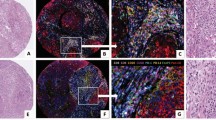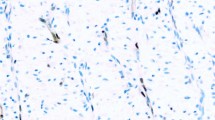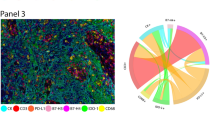Abstract
Direct evidence of tumour seeding in distant organs at the time of surgery for gastric cancer is not available. An immunocytochemical assay for epithelial cytokeratin protein may fill this gap since it is a feature of epithelial cells that would not normally be present in bone marrow. The bone marrow of 46 patients with primary gastric cancer was examined for tumour cells, using immunocytochemical techniques and antibody reacting with cytokeratin, a component of the intracytoplasmic network of intermediate filaments. The monoclonal antibody CK2 recognises a single cytokeratin polypeptide (human cytokeratin no. 18) commonly present in epithelial cells. The expression of tumour-suppressor genes p53 and RB for the primary lesion was also determined using the monoclonal antibodies PAb 1801 and 3H9 respectively, and the proliferating activity was determined by the Ki-67 antigen labelling index for MIB-1 antibody staining. Of these 46 patients, 15 (32.6%) presented with cytokeratin-positive cells at the time of primary surgery. The positive findings were related to the undifferentiated tissue type and to the prominent depth of invasion, but not to other clinicopathological factors. In 2 of 15 (13.3%) patients, the depth of invasion was limited to the mucosa. The metastatic potential to bone marrow did not relate to expressions of p53 and RB genes, or to the proliferating activity of MIB-1 staining for the primary lesion of gastric cancer. As tumour cells in bone marrow are indicative of the general disseminative capability of an individual tumour, this technique may be useful for identifying patients at high risk of metastasis from a gastric tumour.
This is a preview of subscription content, access via your institution
Access options
Subscribe to this journal
Receive 24 print issues and online access
$259.00 per year
only $10.79 per issue
Buy this article
- Purchase on Springer Link
- Instant access to full article PDF
Prices may be subject to local taxes which are calculated during checkout
Similar content being viewed by others
Author information
Authors and Affiliations
Rights and permissions
About this article
Cite this article
Maehara, Y., Yamamoto, M., Oda, S. et al. Cytokeratin-positive cells in bone marrow for identifying distant micrometastasis of gastric cancer. Br J Cancer 73, 83–87 (1996). https://doi.org/10.1038/bjc.1996.15
Issue Date:
DOI: https://doi.org/10.1038/bjc.1996.15
This article is cited by
-
Clinical significance of cytokeratin positive cells in bone marrow of gastric cancer patients
Journal of Cancer Research and Clinical Oncology (2007)
-
Genetic detection of free cancer cells in the peritoneal cavity of the patient with gastric cancer: present status and future perspectives
Gastric Cancer (2007)
-
Detection of cancer cells disseminated in bone marrow using real-time quantitative RT-PCR of CEA, CK19, and CK20 mRNA in patients with gastric cancer
Gastric Cancer (2006)
-
Disseminated cancer cells in the bone marrow: are they really there at all?
Gastric Cancer (2006)
-
Overexpression of dopa decarboxylase in peritoneal dissemination of gastric cancer and its potential as a novel marker for the detection of peritoneal micrometastases with real-time RT–PCR
British Journal of Cancer (2004)



